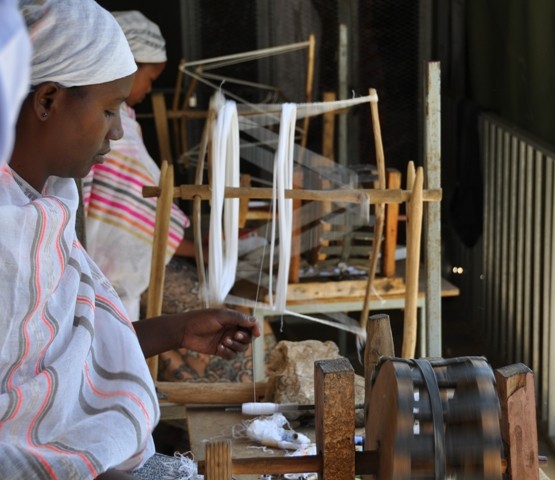
Selamawit Teklu lives on the outskirts of Addis Ababa, Ethiopia, in a town known for the high numbers of traditional weavers from southern Ethiopia settling there. Traditional weavers are respected for their skills and tradition, yet Teklu and her neighbors are viewed as social outcasts with little upward mobility. They work from home to produce traditional Ethiopian wraps called gabis, which they sell to the local market through a series of middlemen.
In February 2013, a USAID-supported program changed the prospects of 100 women including Teklu. Implemented by the Center for African Women Economic Empowerment (CAWEE) and the USAID Competitiveness and Trade Expansion (COMPETE) Trade Hub, the effort readied these weavers to produce for export.
“We take the skills they already possess and raise them to the next level,” says Tadesse Mekuria, a CAWEE trainer. Trainees learned new methods, developed new patterns and color combinations, and generally raised the quality of their products.
CAWEE estimates that by producing pieces for export, traditional weavers can raise their income by as much as 75 percent.
Export companies say they are grateful for the program. “Getting trained and skilled weavers is instrumental for exporting companies to be able to continuously supply to the export market and meet demands of international buyers,” said Sara Abera, owner of Sara Garment Designers and Manufacturers (SGDM) and Muya Abyssinian Crafts.
Teklu says the skills training changed her life. She joined the export company Muya Abyssinian Crafts as a professional weaver. “I see myself continuing in this line of work … trading on a higher path that will lead me to interact with global entrepreneurs.”
All 50 of the first class of CAWEE trainees found placement in export-focused companies, 90 percent of which are owned and managed by women. CAWEE expects similar placement for the next class of 50.
Trainings have also produced a multiplier effect. Teklu has already taught her younger brother the skills she learned, and export-driven companies like SGDM and Muya Abyssinian are expanding – increasing the demand for trained weavers and solidifying Ethiopia’s status as a producer of fine crafts and textiles.
U.S. Ambassador Donald Booth summed up the program: “With this women-led initiative, Ethiopian companies can meet the growing U.S. demand for high-quality, traditionally-made Ethiopian crafts. Everyone benefits – U.S. customers, Ethiopian business owners and traditional weavers.”
The USAID/EA Trade Hub supports projects like “Connecting 100 Traditional Weavers to the Export Market” through its $20 million Partnership Fund, a grants program designed to identify and support leading regional trade associations and innovative organizations in export markets. The Trade Hub also provides technical assistance to African firms and governments to enhance their competitiveness in global markets and help African businesses take advantage of trade opportunities available under the African Growth and Opportunity Act (AGOA). Since 2009, the Trade Hub has facilitated over $100 million in exports to the United States through AGOA and has assisted more than 200 firms to grow their export business and gain market access or expand in the United States.







Comment
Make a general inquiry or suggest an improvement.